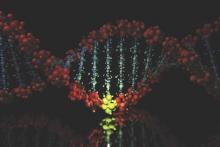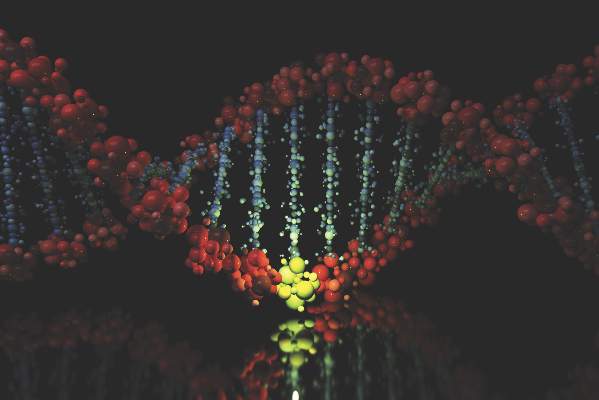User login
SAN ANTONIO – In patients with triple-negative breast cancer, the presence of a mutation in the breast cancer susceptibility genes BRCA1 and BRCA2 appears helpful for identifying those who will benefit from neoadjuvant chemotherapy but not very helpful for estimating prognosis, finds a subgroup analysis from the GeparQuinto trial.
Dr. Peter A. Fasching and colleagues studied 471 patients with triple-negative disease who were treated with neoadjuvant therapy in the trial, underwent surgery, and did not receive any postoperative therapy.
Prospectively specified genome-wide association studies showed that 17.4% of the patients had a BRCA1/2 mutation, he reported at the San Antonio Breast Cancer Symposium.
The rate of pathologic complete response (pCR), defined as ypT0/ypN0 stage, was 50% in the patients with a mutation, compared with 30.8% in those with wild-type genes (P = .001).
The patients with a mutation also had better disease-free survival than their wild-type peers (hazard ratio, 0.64), but this difference missed statistical significance (P = .06).
“BRCA mutation carriers had a significantly higher pathologic complete response rate after neoadjuvant chemotherapy,” commented Dr. Fasching, an oncologist the University Hospital Erlangen (Germany), Comprehensive Cancer Center Erlangen-EMN. “And BRCA mutation carriers had a better prognosis.”
Attendee Dr. George Somlo of City of Hope, Duarte, California, wondered if surgical management played a role in the findings. “Can you clarify…whether mastectomies on the ipsilateral side or contralateral side had any effect on the disease-free survival, since I assume once the mutations were known, other interventions might have taken place?”
“Unfortunately, I cannot,” Dr. Fasching replied. “We did not extend the exploratory analysis to that subpoint.”
Giving some background to the analysis, he commented, “Neoadjuvant studies may serve as a very good research ground to look for answers to both questions: whether BRCA mutation status predicts response to a chemotherapy and, furthermore, whether this translates into a prognostic effect.”
All patients with triple-negative disease in the GeparQuinto randomized phase III trial received neoadjuvant chemotherapy (epirubicin, cyclophosphamide, and docetaxel), with or without the antiangiogenic antibody bevacizumab (Avastin).
Additional findings showed that among BRCA mutation carriers, a pCR was not significantly associated with better disease-free survival. In contrast, among patients with wild-type genes, it was associated with a sharply reduced risk of events (HR, 0.21; P less than .0001). However, the interaction was not statistically significant.
“The prognostic information of pCR with regard to prognosis appeared to be somewhat weaker in patients with a BRCA mutation, compared to wild-type patients, but you have to keep in mind the test for interaction in this exploratory analysis was not significant,” Dr. Fasching commented.
The investigators also performed exploratory analyses looking at the impact of achieving a pCR in each treatment arm.
As far as a rationale, hypoxia is known to cause DNA damage, and synthetic lethality has been described in BRCA mutation carriers, Dr. Fasching explained. “There are some data that show that angiogenic factors are as a matter of fact increased in tumors with a BRCA mutation, compared to wild-type patients,” he added.
Results here showed that addition of bevacizumab improved pCR rate among both BRCA1/2 mutation carriers (65.7% vs. 38.3%, P = .025) and patients with wild-type (35.8% vs. 26.2%, P = .048). But addition of bevacizumab did not significantly improve disease-free survival in either group.
SAN ANTONIO – In patients with triple-negative breast cancer, the presence of a mutation in the breast cancer susceptibility genes BRCA1 and BRCA2 appears helpful for identifying those who will benefit from neoadjuvant chemotherapy but not very helpful for estimating prognosis, finds a subgroup analysis from the GeparQuinto trial.
Dr. Peter A. Fasching and colleagues studied 471 patients with triple-negative disease who were treated with neoadjuvant therapy in the trial, underwent surgery, and did not receive any postoperative therapy.
Prospectively specified genome-wide association studies showed that 17.4% of the patients had a BRCA1/2 mutation, he reported at the San Antonio Breast Cancer Symposium.
The rate of pathologic complete response (pCR), defined as ypT0/ypN0 stage, was 50% in the patients with a mutation, compared with 30.8% in those with wild-type genes (P = .001).
The patients with a mutation also had better disease-free survival than their wild-type peers (hazard ratio, 0.64), but this difference missed statistical significance (P = .06).
“BRCA mutation carriers had a significantly higher pathologic complete response rate after neoadjuvant chemotherapy,” commented Dr. Fasching, an oncologist the University Hospital Erlangen (Germany), Comprehensive Cancer Center Erlangen-EMN. “And BRCA mutation carriers had a better prognosis.”
Attendee Dr. George Somlo of City of Hope, Duarte, California, wondered if surgical management played a role in the findings. “Can you clarify…whether mastectomies on the ipsilateral side or contralateral side had any effect on the disease-free survival, since I assume once the mutations were known, other interventions might have taken place?”
“Unfortunately, I cannot,” Dr. Fasching replied. “We did not extend the exploratory analysis to that subpoint.”
Giving some background to the analysis, he commented, “Neoadjuvant studies may serve as a very good research ground to look for answers to both questions: whether BRCA mutation status predicts response to a chemotherapy and, furthermore, whether this translates into a prognostic effect.”
All patients with triple-negative disease in the GeparQuinto randomized phase III trial received neoadjuvant chemotherapy (epirubicin, cyclophosphamide, and docetaxel), with or without the antiangiogenic antibody bevacizumab (Avastin).
Additional findings showed that among BRCA mutation carriers, a pCR was not significantly associated with better disease-free survival. In contrast, among patients with wild-type genes, it was associated with a sharply reduced risk of events (HR, 0.21; P less than .0001). However, the interaction was not statistically significant.
“The prognostic information of pCR with regard to prognosis appeared to be somewhat weaker in patients with a BRCA mutation, compared to wild-type patients, but you have to keep in mind the test for interaction in this exploratory analysis was not significant,” Dr. Fasching commented.
The investigators also performed exploratory analyses looking at the impact of achieving a pCR in each treatment arm.
As far as a rationale, hypoxia is known to cause DNA damage, and synthetic lethality has been described in BRCA mutation carriers, Dr. Fasching explained. “There are some data that show that angiogenic factors are as a matter of fact increased in tumors with a BRCA mutation, compared to wild-type patients,” he added.
Results here showed that addition of bevacizumab improved pCR rate among both BRCA1/2 mutation carriers (65.7% vs. 38.3%, P = .025) and patients with wild-type (35.8% vs. 26.2%, P = .048). But addition of bevacizumab did not significantly improve disease-free survival in either group.
SAN ANTONIO – In patients with triple-negative breast cancer, the presence of a mutation in the breast cancer susceptibility genes BRCA1 and BRCA2 appears helpful for identifying those who will benefit from neoadjuvant chemotherapy but not very helpful for estimating prognosis, finds a subgroup analysis from the GeparQuinto trial.
Dr. Peter A. Fasching and colleagues studied 471 patients with triple-negative disease who were treated with neoadjuvant therapy in the trial, underwent surgery, and did not receive any postoperative therapy.
Prospectively specified genome-wide association studies showed that 17.4% of the patients had a BRCA1/2 mutation, he reported at the San Antonio Breast Cancer Symposium.
The rate of pathologic complete response (pCR), defined as ypT0/ypN0 stage, was 50% in the patients with a mutation, compared with 30.8% in those with wild-type genes (P = .001).
The patients with a mutation also had better disease-free survival than their wild-type peers (hazard ratio, 0.64), but this difference missed statistical significance (P = .06).
“BRCA mutation carriers had a significantly higher pathologic complete response rate after neoadjuvant chemotherapy,” commented Dr. Fasching, an oncologist the University Hospital Erlangen (Germany), Comprehensive Cancer Center Erlangen-EMN. “And BRCA mutation carriers had a better prognosis.”
Attendee Dr. George Somlo of City of Hope, Duarte, California, wondered if surgical management played a role in the findings. “Can you clarify…whether mastectomies on the ipsilateral side or contralateral side had any effect on the disease-free survival, since I assume once the mutations were known, other interventions might have taken place?”
“Unfortunately, I cannot,” Dr. Fasching replied. “We did not extend the exploratory analysis to that subpoint.”
Giving some background to the analysis, he commented, “Neoadjuvant studies may serve as a very good research ground to look for answers to both questions: whether BRCA mutation status predicts response to a chemotherapy and, furthermore, whether this translates into a prognostic effect.”
All patients with triple-negative disease in the GeparQuinto randomized phase III trial received neoadjuvant chemotherapy (epirubicin, cyclophosphamide, and docetaxel), with or without the antiangiogenic antibody bevacizumab (Avastin).
Additional findings showed that among BRCA mutation carriers, a pCR was not significantly associated with better disease-free survival. In contrast, among patients with wild-type genes, it was associated with a sharply reduced risk of events (HR, 0.21; P less than .0001). However, the interaction was not statistically significant.
“The prognostic information of pCR with regard to prognosis appeared to be somewhat weaker in patients with a BRCA mutation, compared to wild-type patients, but you have to keep in mind the test for interaction in this exploratory analysis was not significant,” Dr. Fasching commented.
The investigators also performed exploratory analyses looking at the impact of achieving a pCR in each treatment arm.
As far as a rationale, hypoxia is known to cause DNA damage, and synthetic lethality has been described in BRCA mutation carriers, Dr. Fasching explained. “There are some data that show that angiogenic factors are as a matter of fact increased in tumors with a BRCA mutation, compared to wild-type patients,” he added.
Results here showed that addition of bevacizumab improved pCR rate among both BRCA1/2 mutation carriers (65.7% vs. 38.3%, P = .025) and patients with wild-type (35.8% vs. 26.2%, P = .048). But addition of bevacizumab did not significantly improve disease-free survival in either group.
AT SABCS 2015
Key clinical point: BRCA1/2 mutation in triple-negative breast cancer is predictive but only weakly prognostic.
Major finding: Patients with a BRCA1/2 mutation were more likely than peers with wild-type genes to have a pCR to neoadjuvant therapy (50% vs. 30.8%), but they did not have significantly better disease-free survival.
Data source: A subgroup analysis of 471 patients with triple-negative breast cancer given neoadjuvant therapy in the GeparQuinto trial.
Disclosures: Dr. Fasching disclosed that he consults for Novartis, Genomic Health, Nanostring, Pfizer, Roche, and Teva; that he is a speaker for Novartis, Pfizer, Roche, Amgen, GSK, Genomic Health, and Teva; and that he receives contracts from Amgen and Novartis. The trial was sponsored by the German Breast Group in collaboration with the AGO Study Group.

